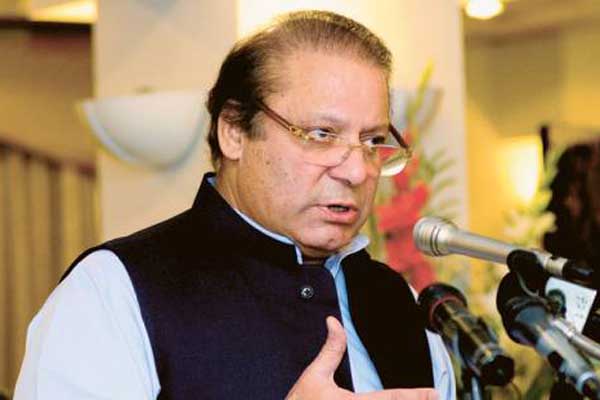|

Nawaz Sharif
Born: December 25, 1949 (age 63), Lahore
Nationality: Pakistani
Spouse: Kalsoom Nawaz Sharif
Siblings: Shahbaz Sharif
Children: Maryam Nawaz Sharif, Hussain Nawaz, Hassan Nawaz
Education: St. Anthony's High School, Government College University, University of the Punjab
|
|
About
- Mian Muhammad Nawaz Sharif (born 25 December 1949) is a Pakistani politician and industrialist who, after his party won the elections of 11 May 2013, is expected to serve as the next Prime Minister of Pakistan, previously having been Pakistan's 12th and 14th Prime Minister for two non-consecutive terms from November 1990 to July 1993 and from February 1997 to October 1999.
- Sharif is the President of Pakistan Muslim League-N, one of Pakistan's largest political parties. As the owner of Ittefaq Group, a leading business conglomerate, he is also one of the country's wealthiest men.
- Sharif rose to prominence as part of General Zia-ul-Haq's military regime in the 1980s under the wing of Governor of Punjab Ghulam Jilani Khan.
- He was appointed Chief Minister of Punjab by Zia in 1985. After Zia's death and Benazir Bhutto's being elected Prime Minister in 1988, Sharif emerged as opposition leader from the conservative Pakistan Muslim League. When Benazir was dismissed by President Ghulam Ishaq Khan in 1990 on corruption charges, Sharif was elected Prime Minister the same year.
- But relations between Sharif and Ghulam Ishaq too deteriorated, with Ghulam Ishaq attempting to dismiss Sharif on similar charges. Sharif successfully challenged the President's decision in the Supreme Court, but both men were ultimately persuaded to step down in 1993 by army chief Abdul Waheed Kakar.
- Serving as the Leader of the Opposition during Benazir's second tenure, Sharif was re-elected Prime Minister with a historic two-thirds majority in parliament, after Benazir was again dismissed for corruption by new President Farooq Leghari.
- Sharif replaced Leghari with Rafiq Tarar as President, then stripped the Presidency of its powers by passing the Thirteenth Amendment. He also controversially ordered Pakistan's first nuclear tests in response to neighbouring India's second nuclear tests. When Western countries suspended foreign aid, Sharif froze the country's foreign currency reserves to prevent further capital flight, but this only worsened economic conditions.
- With rising unemployment and record foreign debt, Sharif's second term also saw tussles with the judiciary and army. After Sharif was summoned for contempt by the Supreme Court in 1997, party workers attacked the court and Chief Justice Syed Sajjad Ali Shah.
- Sharif also fell out with army chief Jehangir Karamat and replaced him with Pervez Musharraf in 1998, but after Pakistan's haphazard performance in the Kargil War, relations between the two also deteriorated. When he attempted to relieve Musharraf from his command on 12 October 1999, the army instead ousted Sharif's government, exiling him to Saudi Arabia.
- Sharif returned in 2007, and his party contested elections in 2008, forming the provincial government in Punjab under Sharif's brother Shahbaz until 2013. He successfully called for Musharraf's impeachment and the reinstatement of Chief Justice Iftikhar Muhammad Chaudhry.
source:http://en.wikipedia.org
|



